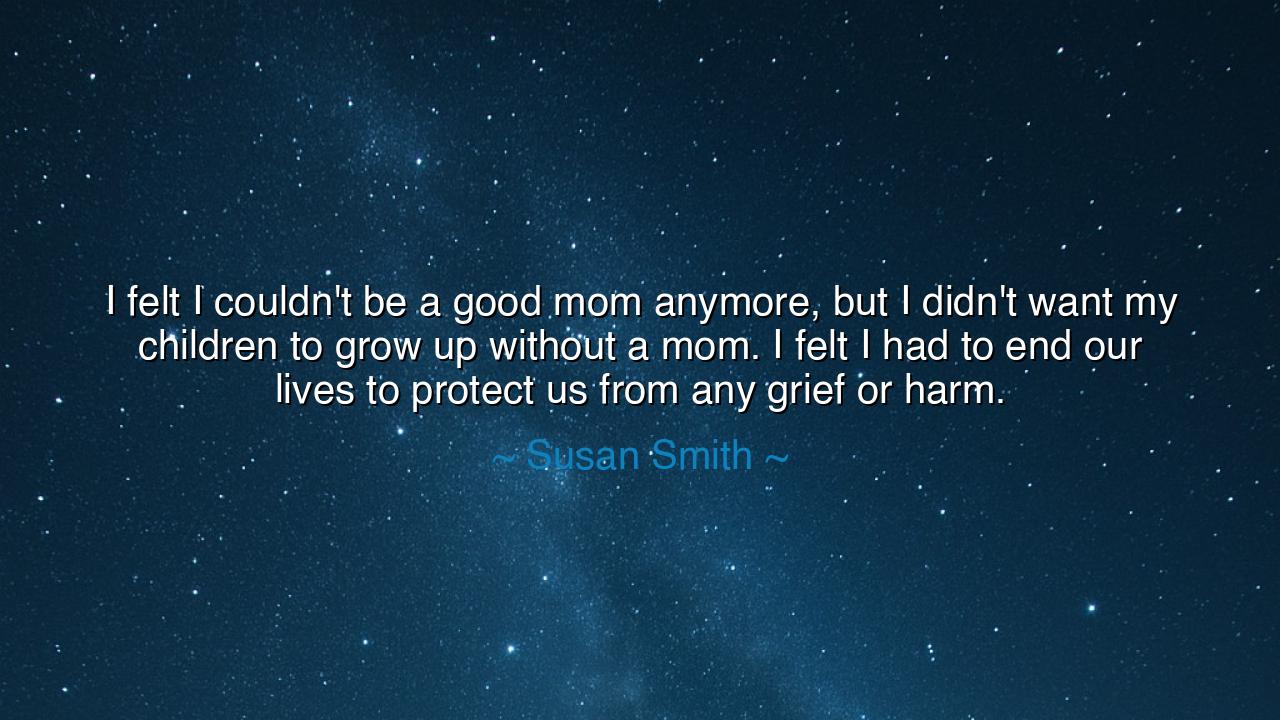
I felt I couldn't be a good mom anymore, but I didn't want my
I felt I couldn't be a good mom anymore, but I didn't want my children to grow up without a mom. I felt I had to end our lives to protect us from any grief or harm.






“I felt I couldn’t be a good mom anymore, but I didn’t want my children to grow up without a mom. I felt I had to end our lives to protect us from any grief or harm.” — thus spoke Susan Smith, and in these dark and chilling words we hear the echo of despair taken to its furthest, most tragic conclusion. This is not a statement of reason, but of a soul consumed by hopelessness, where the natural instinct of a parent to protect becomes twisted by fear and anguish.
The mom, in her truest nature, is a guardian of life. Her first impulse is to shield her children from danger, to give them a world safer and gentler than the one she inhabits. But in Susan Smith’s confession we see how despair can corrupt even love’s purest form. Feeling that she had failed, she imagined that death itself was protection, that by ending their lives she might spare them a greater harm. This is the tragedy: when hopelessness blinds the heart, it makes mercy indistinguishable from destruction.
The ancients spoke of this shadowed path. Consider the tale of Medea, who, betrayed and abandoned by Jason, killed her own children. To the outside world it was monstrous, but to her shattered mind it was an act of defiance and warped justice. Like Susan Smith, Medea’s anguish transformed motherhood into something dark. These stories are not meant to excuse, but to warn: when despair is left untended, it can drive even the tender-hearted to acts unthinkable in calmer days.
The origin of Smith’s words lies in the depths of mental and emotional collapse. She had come to believe she was unworthy of being a mom, that her children’s futures were doomed, that there was no path forward but annihilation. This is how despair speaks: it convinces the mind that all exits are closed, that the only way to protect is to destroy. Yet this is a lie born of isolation, exhaustion, and untreated anguish.
This reflection also shows us the fragility of the human spirit under the weight of guilt, fear, and hopelessness. The same heart that once nurtured can, under great pressure, become the instrument of harm. That is why societies across history have sought not only to judge such acts but to understand them, to create systems where the overwhelmed parent can reach for help before tragedy strikes. The story of Susan Smith is not just a crime; it is also a call to notice the silent desperation of those who feel they are failing.
The lesson is clear: despair distorts reality. It convinces you that there is no help, no hope, no redemption. When you feel unworthy, when you fear you cannot go on, this is the moment not to act alone but to reach outward. Even the smallest voice of support can pierce the darkness. And if you see someone drowning in their own anguish, do not turn away—ask, listen, and offer help, for you may be the lifeline that prevents destruction.
Practical action follows: if you are overwhelmed, speak to someone before the silence grows heavy. Call a friend, a counselor, a neighbor, a helpline. If you are a parent, do not bear your struggles in isolation. And if you know someone who seems broken, do not assume their smile means safety. Extend compassion, offer resources, and be present. Lives may be saved by the simple act of noticing.
Thus Susan Smith’s words, though born of darkness, remain a grim teaching for generations. The mom who believed she was shielding her children from grief by ending their lives shows us the devastating power of despair. Let her story be a warning and a plea: protect the vulnerable before they break, and never let hopelessness become the only voice heard. For even in our lowest moments, there is always another path—if only we reach for it, or if only someone reaches back.






AAdministratorAdministrator
Welcome, honored guests. Please leave a comment, we will respond soon